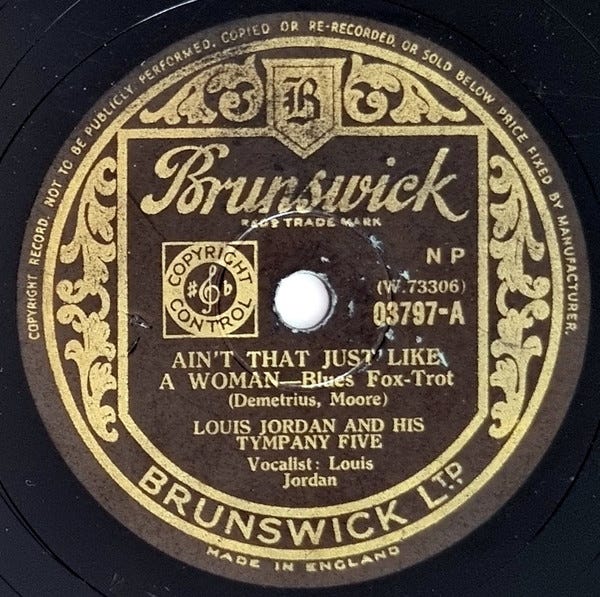Ain’t That Just Like a Woman
Louis Jordan & His Tympany Five (1946). Excerpt from "The 50 Songs that Gave Birth to Rock and Roll"
Behold, the riff upon which Chuck Berry based his career.
Louis Jordan was a brilliant songwriter, a formidable frontman, a wild sax-man, and a genuine superstar of stage, screen, and record. He actually cut his teeth in the same Chick Webb band that also kickstarted Ella Fitzgerald’s career.
The Arkansas-born Jordan was nicknamed the “King of the Jukebox” and, from the late 30s to the early 50s, was one of the most popular performers in America. In fact, Jordan leaves us with such an influential body of work that it pains us to narrow it down to just one song. As the frontman for the Tympany Five, Jordan would produce a torrent of jump blues originals distinctive for their spirited performances, instrumental prowess, and sly, humorous lyrics.
Ultimately, “Ain’t That Just Like a Woman” became a #1 hit on the Race charts and reached #17 on the Pop charts. It earns inclusion here because its lead-in electric guitar riff would become the basis for Chuck Berry’s elemental fretwork a decade later.
It also bears noting that this is a smoking hot R&B number that, in its elevation of the electric guitar, marks yet one step closer to the sound we call rock and roll. In spite of his formative role, Jordan’s own popularity would decline just as the Golden Age of Rock and Roll truly touched off.
That said, Jordan did remain musically active until his death in 1975 at age 66.
See the full list of 50 Songs that Gave Birth to Rock and Roll





Jordan was enormously influential in terms of Black music shifting from big band jazz to small combo rhythm and blues as the major vessel of musical popularity and experimentation, with his virtually nonstop run of hits in the 1940s. He had a unique sense of musical and comic timing that was reflected in all of his recordings. Even if, on this song, the lyrics were a tad misogynistic. (He did, however, have a hit with a tune called "Look Out", which humorously told women what kind of men to avoid dating, as a response to a similar tune for men called "Beware").
Significantly, in the late 1950s, this song returned to the charts via one of Jordan's most famous disciples, Fats Domino, although his version cut out most of the misogynistic lyrics.